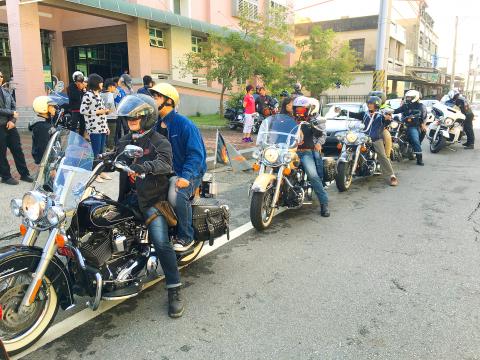On Dec. 12, 30 Harley-Davidson heavy-duty motorcycles assembled at the Taiwan Fund for Children and Families’ (TFCF) Yunlin County Hope Center, where the riders shared their big bike experiences with the students and then gave the children a ride along the Provincial Highway 78 East-West Expressway so that they could enjoy the thrill of riding the wind.
Liao Chih-wen, director of the TFCF’s Yunlin center, says that the Hope Center provides placements for 21 students. He says the center arranges various kinds of art and craft activities to foster the children’s interests, and it encourages the children to take part in walking, hill climbing and road running events so they can have plenty of contact with outsiders, explore new things, absorb other people’s life struggles and experiences and become more competitive in the process.
About 30 members of the Harley-Davidson Free Riders’ Team and the Yunlin Big Bike Association, coordinated by TFCF committee member Lee Mei-hui, arranged to visit the TFCF in Yunlin and spread some good vibes. When one of the students, “Xiao Lin” (not his real name), heard the rumble of the big bike engines, he said his heart was pounding and he felt really excited.

Photo: Huang Shu-li, Liberty Times
照片:自由時報記者黃淑莉
Before the ride, the big bike enthusiasts had a sit-down talk with the students, sharing their experiences of setting up businesses, working, everyday living and riding heavy motorbikes. Then they gave the children a ride on the expressway to find out what it feels like to cruise at speed with the wind in your face. For all the students, this was the first time they had ever ridden big bikes. Most of them felt very thrilled, but there were also one or two students who said it was “a bit scary.”
(Liberty Times, translated by Julian Clegg)
三十部哈雷重型機車十二月十二日齊聚在雲林家扶希望學園,騎士們與學員分享騎重機的經驗,也搭載孩子上台七十八線東西快速道路,享受飆風的快感。
家扶中心主任廖志文表示,希望學園現安置二十一名學員,學園安排各項才藝課程讓孩子能培養興趣,也鼓勵孩子參加健行、登山、路跑,與外界多接觸、多探索、多吸取他們的人生奮鬥經歷,提昇自己的競爭能力。
哈雷自由騎士車隊、雲林重機協會約三十位成員,在家扶委員李美惠居中牽線下,相約到雲林家扶送愛,聽到重機轟隆隆的引擎聲,學員「小林」(化名)說,心臟也跟著碰碰跳,好興奮。
重機車友先與學員座談,分享創業、工作、人生和騎重機的經驗,並搭載孩子上快速道路體驗飆速、飆風的感覺。每位學員都是第一次搭乘重機,多數人覺得好刺激,但也有學員說,「有點恐佈!」
(自由時報記者黃淑莉)

Even as he grows older, Microsoft founder Bill Gates still fondly remembers the catalytic computer code he wrote 50 years ago that opened up a new frontier in technology. Although the code that Gates printed out on a teletype machine may look crude compared to what’s powering today’s artificial intelligence platforms, it played a critical role in creating Microsoft in April 1975 — a golden anniversary that the Redmond, Washington, company celebrated on April 4. Gates, 69, set the stage for that jubilee with a blog post reminiscing on how he and his old high school friend — the late Paul Allen

Australia’s strict immigration policies have long been criticized, particularly for how they treat people with disabilities. Having been residents of Australia for years, Scottish Laura Currie and her Italian partner, Dante Vendittelli, recently experienced the impact of these immigration policies. Their son Luca, born in Australia and diagnosed with cystic fibrosis, became the reason their residency application was denied due to the anticipated high healthcare costs. Had Luca been healthy, there would have been no objections to their permanent residency. This case not only highlights discrimination against disabled individuals, but also raises questions about fairness and inclusion within Australia’s immigration

A: After holding nine concerts in Kaohsiung and Taipei recently, “God of Songs” Jacky Cheung will stage three extra shows later this week. B: They’re compensation for the three shows he postponed last year due to illness. A: He also canceled three more shows in Guangzhou last month. His health is worrisome. B: When touring Guangzhou, he dedicated his hit “She Is Far Away” to late singer Khalil Fong. That’s so touching. A: Online music platform KKBOX has also launched a campaign to pay tribute to Fong. I can’t believe he died so young: he was only 41. A:

The study had several issues. Small sample sizes made it hard to draw __7__ conclusions. Additionally, taking a __8__ like pure MSG on an empty stomach is likely to make a person ill in any case. Choosing individuals who already had a history of the symptoms could have created a bias because they were likely to __9__ the reactions again. When real scientific research on the effects of MSG was eventually done, many of the myths surrounding it were proven __10__. The U.S. Food and Drug Administration and other global organizations have found MSG safe to eat. Today, MSG